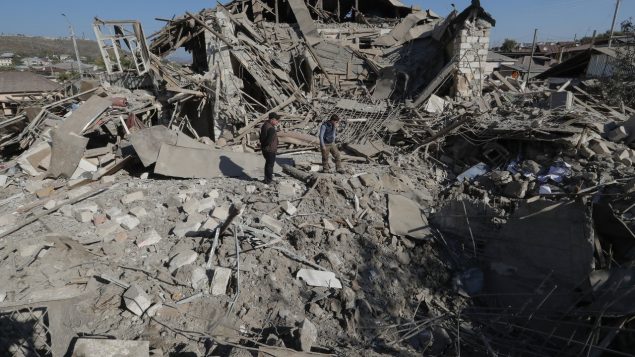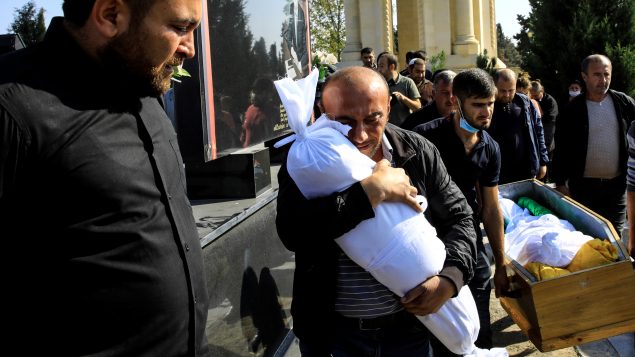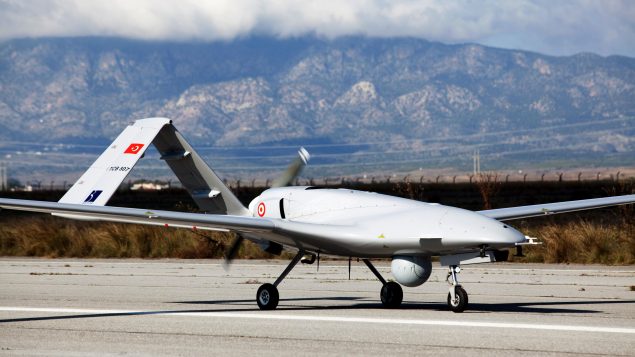Armenian Prime Minister Nikol Pashinyan urged the international community today to follow Canada’s example by suspending exports of military technology to Turkey — after his defence officials claimed they had found Canadian components on a downed Turkish drone.
Pashinyan made the call a day after Armenian defence officials displayed what they claimed are parts of a Turkish combat drone and its Canadian-made optical and target acquisition systems.
A spokesperson for the Armenian Ministry of Defence said the Turkish Bayraktar TB2 drone was shot down by Armenian air defence units during fighting in Nagorno-Karabakh on Monday evening.
Armenian defence officials said the surveillance and attack drone was equipped with a state of the art camera and target acquisition system produced by L3 Harris WESCAM in Burlington, Ont.
The WESCAM CMX-15D system was manufactured in June of this year and installed on the downed Bayraktar TB2 in September, said Shushan Stepanyan, the spokesperson for the Armenian Defence Ministry.
Analysis of the data from the device, which allows drone operators to see and designate targets on the ground, and guide missiles and bombs to it, showed that it had operated for a total of 31 hours, Stepanyan said.

Men stand amidst the ruins of a house following recent shelling during a military conflict over the breakaway region of Nagorno-Karabakh, in Stepanakert, Oct. 17, 2020. (REUTERS)
Fighting in the breakaway Nagorno-Karabakh region of Azerbaijan, which is populated by ethnic Armenians, began on Sept. 27. It’s the most significant outburst of violence since a Russian-brokered ceasefire paused hostilities in 1994.
Armenia has repeatedly accused Turkey of supplying Azerbaijan with arms – including drones and F-16 fighter jets – as well as military advisors and jihadist Syrian mercenaries who are directly involved in the fighting.
Armenian officials have also accused Azerbaijan of using the Turkish drones to not only target military forces but also conduct strikes against civilian infrastructure across Nagorno-Karabakh and in Armenia proper.
Turkey and Azerbaijan have denied these reports and in turn have accused Armenia of shelling civilian areas not only near the frontline but also the country’s second largest city of Ganja.

Timur Xaligov carries his 10-months-old daughter, Narin, who was killed with five other relatives, including her mother Sevil, when a rocket hit their home during the fighting over the breakaway region of Nagorno-Karabakh, in the city of Ganja, Azerbaijan Oct. 17, 2020. (Umit Bektas/REUTERS)
Officials at Global Affairs Canada said they are investigating allegations regarding the use of Canadian technology in the Nagorno-Karabakh conflict and “will continue to assess the situation.”
While the investigation is ongoing, there will be no resumption of exports, officials said.
“We continue to call on both sides to refrain immediately from using force, to respect the ceasefire and protect civilians,” said a statement by Global Affairs.
Officials at the Turkish and Azerbaijani embassies did not respond to Radio Canada International’s request for comment on the latest report about the downed drone in time for publication.
Canada is suspending exports of drone technology to Turkey over reports that it’s being used by the Azerbaijani military against Armenian forces in Nagorno-Karabakh.
Turkey’s ambassador to Canada said he doesn’t know if that technology is being used in the conflict. pic.twitter.com/OVXTkEwHn3
— Power & Politics (@PnPCBC) October 6, 2020
However, in an interview with CBC News Network’s Power & Politics on Oct. 6, Turkey’s Ambassador to Canada Kerim Uras would neither confirm nor deny the presence of Turkish drones in Azerbaijan.
“I would make the case that drones, by pinpoint targeting the aggressor, are actually upholding human rights,” Uras told Power & Politics, adding that suspending exports to Turkey was uncalled for.
“We think it’s surprising, it’s unjustified, it’s hasty, it’s not in line with an allied spirit and it amounts to rewarding the aggressor,” he said.
‘Follow the example of Canada’
In a post on his Facebook page, Pashinyan said that throughout the 23-day war Armenian forces had shot down about a dozen of Bayraktar TB2 drones, but this was the first time they were able to recover the wreckage because it had crashed into a territory controlled by the Armenian military.
“This fact proves Turkey’s direct involvement in the terrorist war against Artsakh and the preparations for it,” Pashinyan wrote on Tuesday, referring to the Armenian name of Nagorno-Karabakh.
“And, based on this fact, the countries that supply the necessary components for ‘Bayraktars’ to Turkey should follow the example of Canada and suspend further supplies.”
Kelsey Gallagher, a researcher with disarmament group Project Ploughshares who has studied Canadian exports of drone technology to Turkey, said while it’s not clear where exactly the drone was shot down, he had no doubt that the device presented by the Armenian military was a Canadian-made WESCAM CMX-15D system.
“This is the clearest footage we have of one of them downed anywhere,” Gallagher said.
“We’ve seen Turkey export the [Bayaraktar] TB2s to Libya, certainly, in breach of the UN arms embargo, to their allies there. And we’ve seen them begin to start selling them to other countries, so it would make sense that they would send them to Azerbaijan.”
However, diverting these drones to Azerbaijan without getting Canada’s permission is illegal, Gallagher said.
Anytime a Canadian weapons system is exported abroad it has to get an export permit approved by Global Affairs Canada, he said.
That export permit must specifically state who the intended recipient is and what that weapon system would be used for.

Canada’s Armenian community is joining disarmament group Project Ploughshares in calling on the federal government to ban the export to Turkey of Canadian-made WESCAM sensors and targeting systems. A Turkish Bayraktar TB2 drone is pictured with with its WESCAM MX-15D sensor and targeting system under belly. (Birol Bebek/AFP/Getty Images)
Gallagher said these WESCAM optics and target acquisition systems have been exported to Turkey in “high volumes” since 2017 but there is no indication that they were exported to Azerbaijan.
“They shouldn’t be there because Azerbaijan would not be deemed the intended recipient,” Gallagher said. “So, essentially, they were handed off to Azerbaijan via Turkey and that relationship is illicit.”
‘We’re not talking about a few cameras’
Foreign Affairs Minister Francois-Philippe Champagne has suspended the export licence for WESCAM’s exports to Turkey pending the investigation into whether these devices were used by Azerbaijan in fighting against Armenian forces in Nagorno-Karabakh.
Speaking to reporters on Friday at the conclusion of his European tour where he discussed the Nagorno-Karabakh war and Turkey’s tensions with Greece in the Eastern Mediterranean with EU and NATO allies, Champagne said he was very firm with his Turkish counterpart Mevlut Cavusoglu.

Canadian Foreign Minister Francois-Philippe Champagne speaks during a joint news conference with his Greek counterpart, Nikos Dendias, after their meeting, in Athens, on Tuesday, Oct. 13, 2020. (Petros Giannakouris/AP Photo)
“I think in my discussion with the foreign minister of Turkey I was very clear about the legal framework that exists in Canada when it comes to the export control regime, that Canada was party to the Arms Trade Treaty, that human rights are a core component under our legislation and I would abide by the spirit and the letter of the law,” Champagne said.
“I think he understood that, I think he respects Canada’s position and that we were very transparent in our approach and certainly I will not hesitate to suspend any permit or to cancel any permit where there is allegation or evidence that the subject equipment would be used contrary to Canadian law.”
But an off-the-cuff remark by Champagne who said it was important to understand that “we’re talking about a few cameras” has both Project Ploughshares and Canada’s Armenian community worried that the federal government is looking for a way to resume exports of these devices at some point in the future.
Gallagher said the WESCAM optical and target acquisition systems are more than just cameras.
“Without these sensors Turkey would not be able to conduct modern air strikes as we know them,” Gallagher said. “And any military that receives Turkish drones without these sensors would likewise not be able to conduct modern airstrikes as we know them.”
Canada’s Armenian community also took issue with part of Champagne’s comments.
“We’re not talking about a few cameras. We’re talking about Armenian blood on Canadian hands,” said a statement released by the Armenian National Committee of Canada (ANCC).







For reasons beyond our control, and for an undetermined period of time, our comment section is now closed. However, our social networks remain open to your contributions.